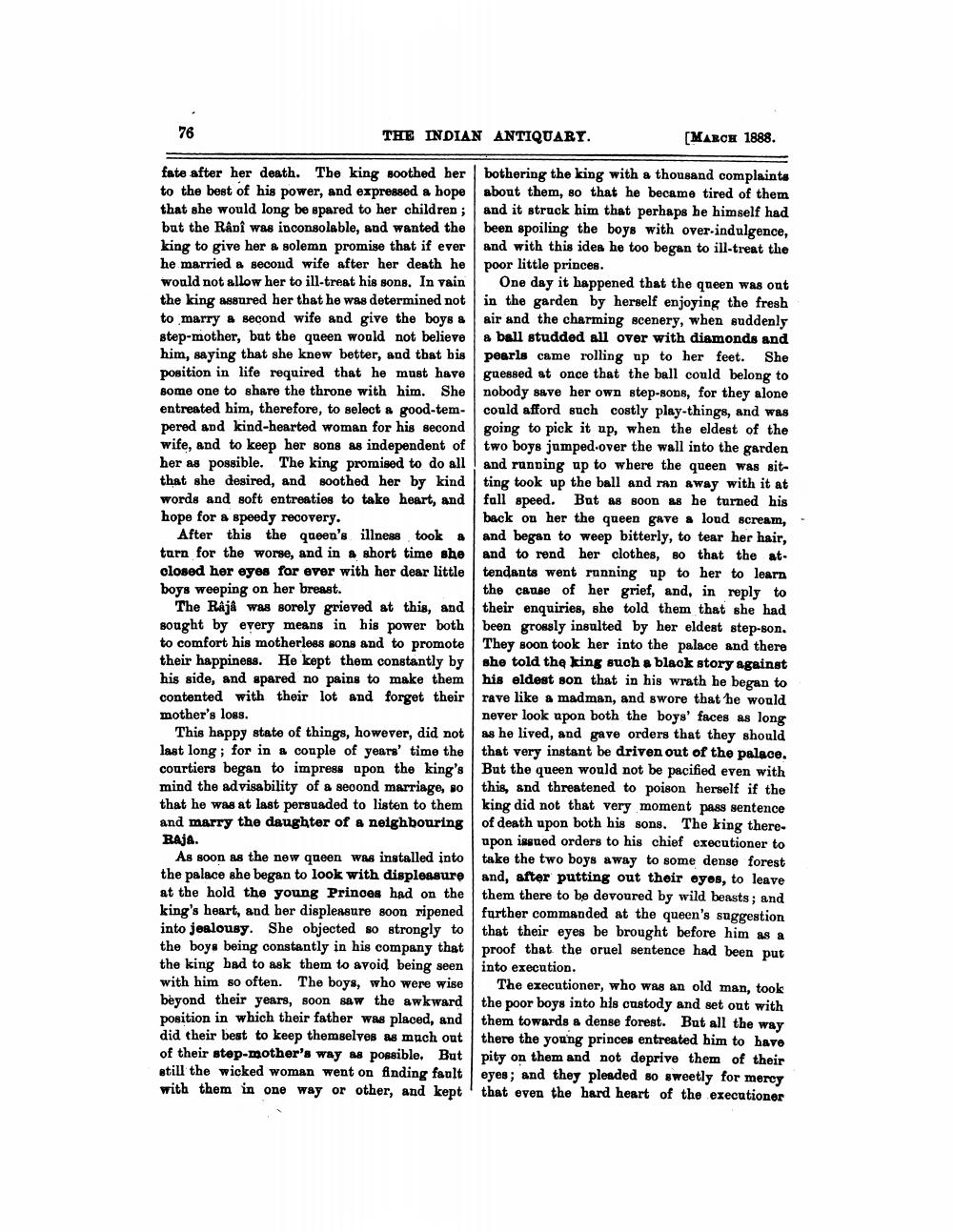________________
76
THE INDIAN ANTIQUARY.
fate after her death. The king soothed her to the best of his power, and expressed a hope that she would long be spared to her children; but the Rânî was inconsolable, and wanted the king to give her a solemn promise that if ever he married a second wife after her death he would not allow her to ill-treat his sons. In vain the king assured her that he was determined not to marry a second wife and give the boys a step-mother, but the queen would not believe him, saying that she knew better, and that his position in life required that he must have some one to share the throne with him. She entreated him, therefore, to select a good-tempered and kind-hearted woman for his second wife, and to keep her sons as independent of her as possible. The king promised to do all that she desired, and soothed her by kind words and soft entreaties to take heart, and hope for a speedy recovery.
After this the queen's illness took a turn for the worse, and in a short time she closed her eyes for ever with her dear little boys weeping on her breast.
The Raja was sorely grieved at this, and sought by every means in his power both to comfort his motherless sons and to promote their happiness. He kept them constantly by his side, and spared no pains to make them contented with their lot and forget their mother's loss.
This happy state of things, however, did not last long; for in a couple of years' time the courtiers began to impress upon the king's mind the advisability of a second marriage, so that he was at last persuaded to listen to them and marry the daughter of a neighbouring Raja.
As soon as the new queen was installed into the palace she began to look with displeasure at the hold the young Princes had on the king's heart, and her displeasure soon ripened into jealousy. She objected so strongly to the boys being constantly in his company that the king had to ask them to avoid being seen with him so often. The boys, who were wise beyond their years, soon saw the awkward position in which their father was placed, and did their best to keep themselves as much out of their step-mother's way as possible. But still the wicked woman went on finding fault with them in one way or other, and kept
[MARCH 1888.
bothering the king with a thousand complaints about them, so that he became tired of them and it struck him that perhaps he himself had been spoiling the boys with over-indulgence, and with this idea he too began to ill-treat the poor little princes.
One day it happened that the queen was out in the garden by herself enjoying the fresh air and the charming scenery, when suddenly a ball studded all over with diamonds and pearls came rolling up to her feet. She guessed at once that the ball could belong to nobody save her own step-sons, for they alone could afford such costly play-things, and was going to pick it up, when the eldest of the two boys jumped over the wall into the garden and running up to where the queen was sitting took up the ball and ran away with it at full speed. But as soon as he turned his back on her the queen gave a loud scream, and began to weep bitterly, to tear her hair, and to rend her clothes, so that the attendants went running up to her to learn the cause of her grief, and, in reply to their enquiries, she told them that she had been grossly insulted by her eldest step-son. They soon took her into the palace and there she told the king such a black story against his eldest son that in his wrath he began to rave like a madman, and swore that he would never look upon both the boys' faces as long as he lived, and gave orders that they should that very instant be driven out of the palace. But the queen would not be pacified even with this, and threatened to poison herself if the king did not that very moment pass sentence of death upon both his sons. The king thereupon issued orders to his chief executioner to take the two boys away to some dense forest and, after putting out their eyes, to leave them there to be devoured by wild beasts; and further commanded at the queen's suggestion that their eyes be brought before him as a proof that the oruel sentence had been put
into execution.
The executioner, who was an old man, took the poor boys into his custody and set out with them towards a dense forest. But all the way there the young princes entreated him to have pity on them and not deprive them of their eyes; and they pleaded so sweetly for mercy that even the hard heart of the executioner




